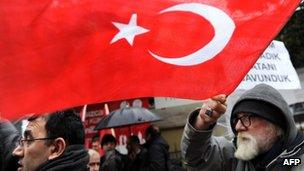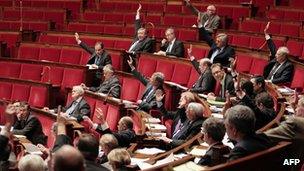French bill re-opens old wounds with Turkey
- Published

The revived French proposal has angered Turks
In 1915, the French Navy evacuated Armenian refugees from the Turkish coast to save them from almost certain death.
Nearly 100 years later, France and Turkey are again on opposite sides with the Armenians' fate, once again, the bone of contention.
The French National Assembly has decided that denying the Armenian genocide should henceforth be a crime.
The draft law must now be debated by the upper house - the Senate.
This is, of course, one of the most contentious issues in modern Turkish history. There is little doubt that huge numbers of Armenians were displaced and killed both during and after World War I.
Where Turkey and its critics disagree, is on the extent to which this was organised persecution and there are also disagreements about the overall scale of the tragedy.
Upset
It was an episode that evoked great passions in the Christian West, with journalists, clergymen and travel writers all eager to champion the Armenian cause.

Some commentators suggested that the bill is timed ahead of Mr Sarkozy's election campaign
Clearly, it still evokes strong feelings. The French political debate has been variously characterised as an attempt to protect the memory of a terrible period at the start of the 20th century; a travesty of history; an electoral manoeuvre; or perhaps even a thinly-veiled attempt to distance Turkey from the European Union's doors.
There's no doubting that the Turkish government is upset. It has recalled its ambassador from Paris.
The Turkish Prime Minister Recep Tayyip Erdogan has said that the French parliament has opened up wounds that will be difficult to heal.
For now, Turkey is cancelling all economic, political and military meetings between the two countries.
French warplanes will not be allowed to land in Turkey and French warships will not be welcome at Turkish ports.
This is an extraordinary step for one Nato ally to take against another. While the cancelling of military visits may not present much of a problem, the disruption of wider diplomatic contacts between Paris and Ankara is much more serious.
Election manoeuvre?
Turkey has become a key player in the region and, with crises developing in Syria and Iraq, the French - along with other key UN Security Council members - need to co-ordinate closely with the Turks.
No wonder then that there have been so far unconfirmed press reports in France suggesting a certain degree of annoyance in the French foreign ministry that this draft law came to parliament now.
Some French commentators suggest that there is indeed an electoral dimension here.
With French President Nicolas Sarkozy up for re-election in 2012 he is eager to court every constituency, including some 500,000 French citizens of Armenian descent.
The French parliament has a track record of pronouncing on historical events, ranging from the Holocaust, to slavery.
In 2005 there was even an attempt to force French schools to teach pupils about "the positive role of the French presence overseas" during the colonial era.
When proposals to sanction anyone denying the Armenian genocide first came before the French parliament in 2006, several of France's most-respected historians insisted that "in a free country, it was not the place of parliament or the courts to define historical truth".
That first time around the Turks were also very upset. A senior French diplomat was despatched to Ankara to reassure them.
And, in the end, the French Senate rejected the draft law in May 2011. Nonetheless, this time it may take more than just a bit of reassurance to patch up fraying Franco-Turkish ties.
- Published22 December 2011